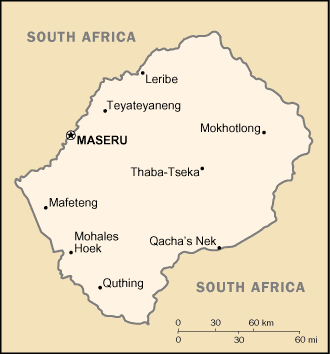Welcome to the Virtual Education Wiki ~ Open Education Wiki
Lesotho: Difference between revisions
(tidied and added self-cat and cat COI) |
(→Lesotho education policy: added brief entry) |
||
| Line 22: | Line 22: | ||
== Lesotho education policy == | == Lesotho education policy == | ||
(sourced from http://en.wikipedia.org/wiki/Education_in_Lesotho) | |||
Education in Lesotho is ''not'' compulsory or free. In 1996, the gross primary enrollment rate was 107.7 percent, while the net primary enrollment rate was 69.9 percent, with higher rates for girls than boys. Many young boys involved in herding forgo even the most basic levels of primary education. | |||
== Lesotho education system == | == Lesotho education system == | ||
Revision as of 21:27, 5 January 2010
Partners situated in Lesotho
None.
Lesotho in a nutshell
(sourced from http://en.wikipedia.org/wiki/Lesotho)

Lesotho, officially the Kingdom of Lesotho, is a landlocked country and enclave — entirely surrounded by the Republic of South Africa. Its size is just over 30,000 km².
Lesotho has an estimated population of almost 1,800,000.
Its capital is Maseru.
It is the southernmost landlocked country in the world. It is a member of the Commonwealth of Nations.
The name Lesotho translates roughly into "the land of the people who speak Sesotho".
About 40% of the population live below the international poverty line of US$1.25 a day.
Lesotho education policy
(sourced from http://en.wikipedia.org/wiki/Education_in_Lesotho)
Education in Lesotho is not compulsory or free. In 1996, the gross primary enrollment rate was 107.7 percent, while the net primary enrollment rate was 69.9 percent, with higher rates for girls than boys. Many young boys involved in herding forgo even the most basic levels of primary education.
Lesotho education system
Higher education
Universities in Lesotho
Polytechnics in Lesotho
Higher education reform
The Bologna Process
Administration and finance
Quality assurance
Lesotho HEIs in the information society
Towards the information society
Information society strategy
Virtual Campuses in HE
Interesting Virtual Campus Initiatives
Interesting Programmes
Re.ViCa Case-study
None.